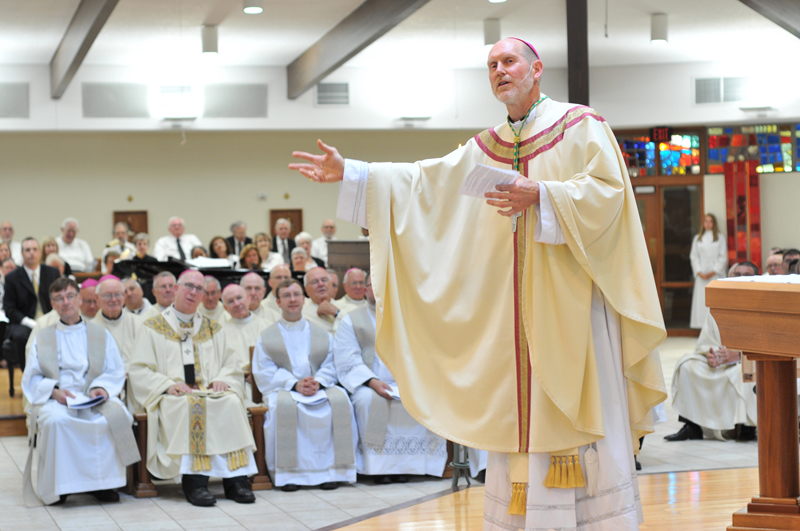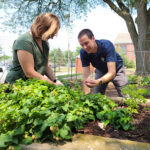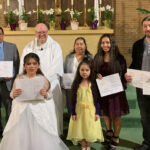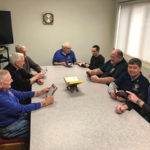
Bishop Thomas Zinkula addresses the congregation after being ordained and installed as Ninth Bishop of the Diocese of Davenport at St. John Vianney Church in Bettendorf on June 22.
(The following Q&A interview of Bishop Thomas Zinkula by Catholic Messenger Editor Barb Arland-Fye took place April 19, the day the Vatican announced that he would become the Ninth Bishop of the Diocese of Davenport, succeeding Bishop Martin Amos. The interview has been edited for clarity.)
Q: What was your reaction to the announcement of your appointment as Ninth Bishop of the Diocese of Davenport being made on your 60th birthday?
A: I didn’t choose the date (April 19). That was proposed, and once it was set, it was “Oh, by the way, that’s my birthday.” And then the ordination date (June 22), again, I didn’t say, “I want this date.” But it’s the feast of St. Thomas More. … He’s a lawyer, so that’s kind of a cool thing.
Q: How familiar are you with the Diocese of Davenport?
A: One (set) of my great-grandparents moved to Cedar Bluff; it’s not even an incorporated town, west of Tipton. They bought some land and lived there for a while and eventually came to the Mount Vernon area. Sts. Peter and Paul, where I was baptized, was a mission of Solon. It was a little Czech parish; it’s no longer open…. There’s a Zinkula window there.
Q: What happened to the church building?
A: Supporters (of Sts. Peter and Paul Chapel, now an events center) raised $200,000 when the church closed. It has air conditioning now. When I was a little kid, it had an outhouse. And they’ve fixed up the kitchen. (The building) is way better now. The University of Iowa has (singing) quartets there; it’s perfect for that, and there are weddings and family reunions…. Bishop Amos actually was out there for (the former church’s) 100th anniversary. They asked him to come for a Mass. They had the Mass out in the cemetery. They invited me to it, but I was on vacation. It would have been fun to be a part of that.
Q: How would you describe your management style?
A: I’d see myself as a servant leader … that works for me to operate out of that mind set. …You work together. I’ll be given power, but you earn authority, that’s the thing. You get the respect of people and trust. Collaborate, communicate, consult, consensus, that’s the ideal. … People are going to be behind you if they’ve been a part of it.
Q: What issues are you most concerned about in the United States or the world?
A: In terms of church, we were talking about secularism … people are not practicing as much, especially young people. Why do we not have enough priests? Well if people aren’t practicing … That’s where the priests come from. And on the other side, we don’t need as many (priests) because people aren’t practicing as much. It all fits together. This is why it is the way it is.
Q: What do you think the Catholic Church can do to inspire more Catholics to participate in the sacraments?
A: That’s the million dollar question. … As adults, we need to learn our faith better. We learn our faith as children and that’s fine; we’re really good at that. And then (we think we’re) done. But as adults, we don’t know our faith that well. Formation and education — that’s huge, especially for adults; and then to celebrate well. Dive into the liturgy and hospitality and music and homilies and active participation — full, active and conscious participation. That would go a long, long, long way. And then live it. Evangelize. Talk about our faith with people. If we know our faith better, if we’re inspired by our liturgies …
Q: So, we need to concentrate more on adult faith formation?
A: Yes, I think so. But how do you get them to do that? Everybody is so busy.
When I was a deacon in seminary at Catholic University (in Washington, D.C.), I worked on weekends at a parish in Silver Springs, MD. The deacon is in charge of RCIA. There were 10 people; it was an interesting group. One woman’s dad was a diplomat from Nigeria … I had to find sponsors for them. I didn’t know a lot of people in that parish because I was just there on weekends. So I would be asking people every week, would you mind? Afterwards, they all thanked me. They said, “I think I learned more than the person I was sponsoring.” Later, when I was a pastor, I’d asked someone to be a sponsor. I’d say, “I’m giving you a gift … I adopt you to be a sponsor. You’ll learn a lot about your faith as an adult with life experiences and wisdom under your belt.
Q: What was a pivotal movement for you in learning about the Catholic faith?
A: I had never gone to a Catholic school until seminary. I grew up in a family, very Catholic. So here I am, 28 or 29, in my first semester (at the seminary). I was so excited about, as an adult, learning my faith. I would daydream about … and I know this is totally unrealistic, it could never happen, but wouldn’t it be great if every Catholic could find some way to take a year off … they’d have to get everything in: Scripture, theology and liturgy … to learn their faith. That would transform their lives; it would transform marriages; it would transform parishes. But not everyone can do that. More people are pulled into (adult faith formation) through a retreat or something like that, or a spiritual experience or a community kind of thing, or service. … There are people who will say that before they made their CEW (Christian Experience Weekend) that church was boring, but the weekend after, they looked at it differently. They were engaged. But they need to take the next step. Go deeper into it. I challenge them to do that, to do something they’re interested in (such as) the lay formation program.
Q: What about small-faith sharing groups?
A: You can work a lot of stuff into that. You can work in service; you can work in Scripture study; you can work in whatever else, prayer. I’m just talking, not saying that’s what we’re going to do. But those are the things I think about.
Q: How are you preparing to become Bishop of the Diocese of Davenport?
A: I’ve been talking to Archbishop (Michael) Jackels. He lives with us (at the seminary); I know him well. I asked him to be my mentor. The nuncio and the two bishops are saying you’re supposed to do a retreat. (The bishop-elect did complete a retreat before ordination.) There’s a document from the Vatican about being a bishop (On the Bishop, Servant of the Gospel of Jesus Christ). I actually read that when Archbishop (Emeritus Jerome) Hanus asked me to be Episcopal Vicar. I was doing bishop kinds of things. I read the document from that perspective. I’m going to read it more carefully now. And I’ll read (Directory for the Pastoral Ministry of Bishops). But the other one is more reflective…. You prepare as much as you can prepare. It’s the same way with marriage; it’s the same way with being a priest, with being a pastor, a rector. All of this is important. It’s foundational.
Q: How did your family react to the news?
A: I talked to my brother, he’s the one in London; otherwise it’s just been texting.
Q: How about your mom?
A: I’m going to take a loop on the way back and stop to see her and maybe have dinner with her. It’s going to be a big deal for her, of course. She knows about it.
Q: How did your parents react when you told them you were considering the priesthood?
A: Initially, I think my dad kind of liked having a lawyer son. He wasn’t opposed (to my vocation); he was kind of quiet for a bit and then he was on board. But my mother; you know a mother’s intuition. She said, “I was wondering if that might be…”
Q: Did you think about becoming a priest earlier in life?
A: I was a shy kid. I was shy and the priests were older …they were younger than me now, probably. But here’s this older guy in a very public role. I didn’t see me doing that. When I was in high school … the archdiocese did some sort of vocation thing. And every pastor was supposed to send in the names of guys from their parish they thought maybe would be a good priest or potential candidate. So my pastor sent my name in and I got a letter from the archbishop … that was a big deal for me. I didn’t do anything with it. I thought, “That’s not me.” But I still have that letter. So that was a seed for me. But I didn’t think about priesthood through the rest of high school, college, law school, at all, not once.
Q: What got you thinking about the priesthood again?
A: What happened with me – I’m practicing law, and I’m going to Mass on Sundays. I’m not registered in a parish, just a young guy, dating and stuff. But there was something missing. Practicing law was fine; it was good. It wasn’t like I was looking for a different job or career. But on the side, the weekends, evenings, I felt God was calling me, wanting me to do something. I knew it was of service. So I got involved in the United Way and something for the elderly and the YMCA. And still I was praying, there’s something God wants me do. This went on for two years. Not every night, but pretty regularly. So I was praying, praying, praying. And then I had this experience one night, it was the middle of the night. The priesthood was there, right on the table; out of the blue. It was exciting. It was the Holy Spirit. I couldn’t sleep at night. I paced around my apartment. I didn’t tell anybody. I started going to daily Mass on my way into the office in downtown Cedar Rapids. I didn’t tell anybody for two months. This was in October 1985. And then I made an appointment with this pastor (Msgr. Robert Ferring) who had been at my parish and who now was the vicar general.… He was the first person I told. That was the guy that sent my name in. I really respected him…. By that afternoon I was in the vocations director’s office … I kept it quiet. I took a night course at Mount Mercy College in philosophy in the spring semester and left the law firm at the end of May 1986.
Q: What priest influenced you as a child?
A: Father Bob Ferring. I respected him because he was a farm boy from northern Iowa. He was good at baseball; he was just a common-sense kind of guy. He was bright and so they sent him off to Fordham and he got a doctorate in physical science. He taught at Loras College and then he wanted to get out of education and into parish work. Mount Vernon was a good kind of starter place for him. I always loved how he could balance common sense … and how he could talk to anybody, and also have that academic background. I really enjoyed how he was able to balance that out.
Q: How did your parents’ faith influence you?
A: Their faith was really strong. (He pauses, reflecting on the memory of his dad, who died in November. The bishop-elect then shared a story about his dad’s determination to make Mass, no matter what). We lived at the bottom of two hills with a gravel road…. There’d be a snow storm, and maybe there would be nine kids, maybe a baby and an infant, in this station wagon and we’re heading to church! There’s this one corner that would get drifted in. My dad would back up and hit it, and back up and hit it and get through …. (My parents) were very involved in everything in the church. That was huge. We prayed the rosary at night.
Q: Did your family pray the rosary every night?
A: I think it was maybe during Lent. I remember praying; I remember whining about it, too. They just worked very hard. They were disciplined, my dad in farming and my mom as a housewife….
Their goal was for all of us to go to college. That was our goal.
Q: What if any impact did athletics have on your life as a person of faith?
A: I think you learn things about discipline that you can apply to your faith life. The team aspect of it, that’s a huge thing; commitment, dedication. (The apostle) Paul uses that kind of language in his letters. Run the race … and the sacrifices that you make to do well. Also, I think it’s giving glory to God…. When I’m talking to kids about this sort of thing, they’re thinking about recognition and awards. OK, that’s fine. But I tell them … here’s something to reflect on: you’ve got this gift, or any gift that you have, use it to give glory to God and to bring joy to other people, and continue to use your gifts. That’s a deeper, more wonderful reason to play sports, and not just to say “We’re number one.”
Q: How did your earlier careers in the insurance business and law impact your faith?
A: Looking back, I can see God preparing me all the way. .. In law, you’re taught to analyze situations and to see the issues and to be able to see arguments on both sides. You make decisions using critical thinking. For me, it helped develop confidence…. I was a shy, quiet kid … I wasn’t ready (for the priesthood) then. I had inner confidence that was very strong. And drive. (But) I needed to take that time … I needed to go down that (career) path. It wasn’t a waste of time at all.
Q: How did you discern your vocation?
A: Daily Mass, prayer, talking to my former pastor, talking with the vocation director. They didn’t have the kinds of things they have now (such as Andrew Dinners and days of discernment). I just knew…. that was what God wanted for me to do. It needed to be validated; I needed to go through seminary, but I knew that was what God wanted me to do.
Q: Do you have a spiritual director?
A: I do. I’m also in a priest support group as well, a prayer group. We’ve been together for a long, long time. We’ve probably been together 25 years.
Q: What is your favorite form of prayer?
A: I’m more into contemplative prayer. I’ll do Lectio Divina for a while, maybe even a few years … I did a sabbatical after I left parish ministry … and did the Ignatian 30-day silent retreat, which was great. It was a transition point in my life. It was a good time to do it.
Q: You spent two months in India during that sabbatical. Were you among the poorest of the poor or among middle class or wealthy people?
A: I rubbed shoulders with all of them. I love learning. I like learning about traditions, and ways of approaching life. You find out people are people everywhere.
Q: What is your favorite book in the Old Testament?
A: I kind of like the book of Jonah. It’s funny. It’s so real … (Jonah’s) trying to run away from God.
Q: What is your favorite book in the New Testament?
A: I like Luke’s Gospel … I like how he approaches the poor and women.
Q: What lessons did you take away from serving on the marriage tribunal?
A: The pain in people’s lives. Marriages don’t always work. I definitely saw that. When you see the underside of marriage, you actually come to a better appreciation of what a good marriage is. Not so much in recent years, but I used to be on the Engaged Encounter weekend, as spiritual director. I’d do one of those a year, partly because when you see marriages that don’t go well, you want to do what you can to help them start off. We used to have this thing called “Retrouvaille” for hurting marriages. I did that for a few years. In the Code (of Canon Law), the thing we’re supposed to do first is to try to keep marriages together. So I figured engaged encounter is setting them up, that’s one way to keep them together and then when they’re hurting (Retrouvaille). That should be a ministry for someone working in a tribunal — to try to keep marriages together. It’s amazing how successful that was; to get people talking, in a prayerful way.
Q: What did you appreciate most about being a parish priest?
A: You know how Jesus talks about his relationship with the church? He’s the bridegroom and the church is his bride, that nuptial imagery. We priests are “in persona Christi.” And that’s how I approach my ministry, especially with parish ministry. I feel this love affair; this is a marriage. They (parishioners) don’t probably see it quite that way. But that’s how I see it and I’m going to give myself totally to these people. I’m going to lay down my life for them. I’m being sort of dramatic … that’s why for me, the hardest thing about being a priest is leaving a parish to begin a new assignment…. but it’s also a really important time of growth, too, because I recognize that only God can ever be there for me totally…. My family can’t just leave everything, and my close friends, and just “walk with Tom.” … It’s like God, really, it’s just you and me, ultimately.
Q: How did you your work in cluster parishes prepare you to be an Episcopal Vicar?
A: I served as a supervising priest for a bunch of parishes. It was perfect for me because I did that when I was in those parishes in northern Dubuque County. There was a nun who was the parish life coordinator for a couple of parishes, so I worked with her. I was sacramental priest for a parish; I was a pastor with another of the parishes and the three of them worked together and then there were five of them (clustered parishes). There was a religious brother who became the parish life coordinator and I worked with him…. So I knew that whole thing very well. So, when I became a vicar, I thought, I can do that. I can work with them. And support them.
Q: You’ve done a lot of different things over the years. How has that impacted you?
A: I grew up on a farm. It was a century farm in the 1980s. So it was stability, stability, stability. I was there 18 years. Since then I’ve never been anywhere longer than four years. I was in college four years, spent one year doing actuary, three years in law school, three years practicing law, four years in seminary, three years as associate pastor; three years as associate pastor at another place, two years studying canon law, three years and four years in another group of parishes, two years at Holy Ghost and then Episcopal Vicar for three years and then rector for three years. I’ve never asked to move anywhere.
Q: How has being rector shaped you as a priest?
A: I think I’ve embraced more the idea of being a spiritual father. I’ve learned that’s a huge piece for these guys. They’re looking for that. They need that…. I think I have a better sense of what’s going on their world, their young adult world. It’s kept me young, too, in terms of their idealism, hopefulness…. I’ve thought a lot about the priesthood, too, because I’m talking about the priesthood (as seminary rector and teacher). So it’s good for me, no matter what I’m doing in the priesthood, especially as a bishop, to have a better sense of the priesthood, to revisit it at this point in my life.
Q: What have you learned from these young seminarians?
A: I like the idea of uncertainty … there’s truth, yes, but I don’t think we come across well with atheists and others when we think we have all the answers.… One of the seminarians was telling me the other day that he thinks their generation is looking for more certainty. There are all kinds of relativism, the “your truth is your truth and my truth is my truth” (line of thinking). They want something to grab onto. That’s interesting. For me, I like to play with the idea of being uncertain, and these guys are looking for certainty. I hear that, but it’s OK to be uncertain, to enter the mystery. I think another thing I’ve learned from them – at least the ones in seminary and the kids really involved in campus ministry, is that adoration of the Blessed Sacrament is a huge thing for them. In a loud, fast-paced world, to be in the quiet, and silence, that’s a big thing for these guys. I think they can hear God’s voice speaking to their hearts when they’re in that quiet.
BISHOP’S FAVORITES:
Favorite saint: St. Thomas More (the lawyer, of course).
Favorite food: Kolaches, poppy seed kolaches.
Favorite sport: Football.
Favorite newspaper: Yours, he joked.
Favorite book: “Patience with God: The Story of Zacchaeus Continuing in Us,” by Tomas Halik.
Favorite social media: None.
How important is social media in engaging the culture: “Very important. The pope’s all over that; (Bishop) Robert Barron is all over that.”
Hobbies: I like to bike; I run once a week and cross country ski in the winter; I like to read and to travel.












Thank you to Editors and the Journalist
for the Questions and Answers. After reading all this
I got my Catholic Messenger in mail!
Also, The You Tube’s were so awesome.
Looking forward to more from our nice farm boy
Bishop Zinkula.